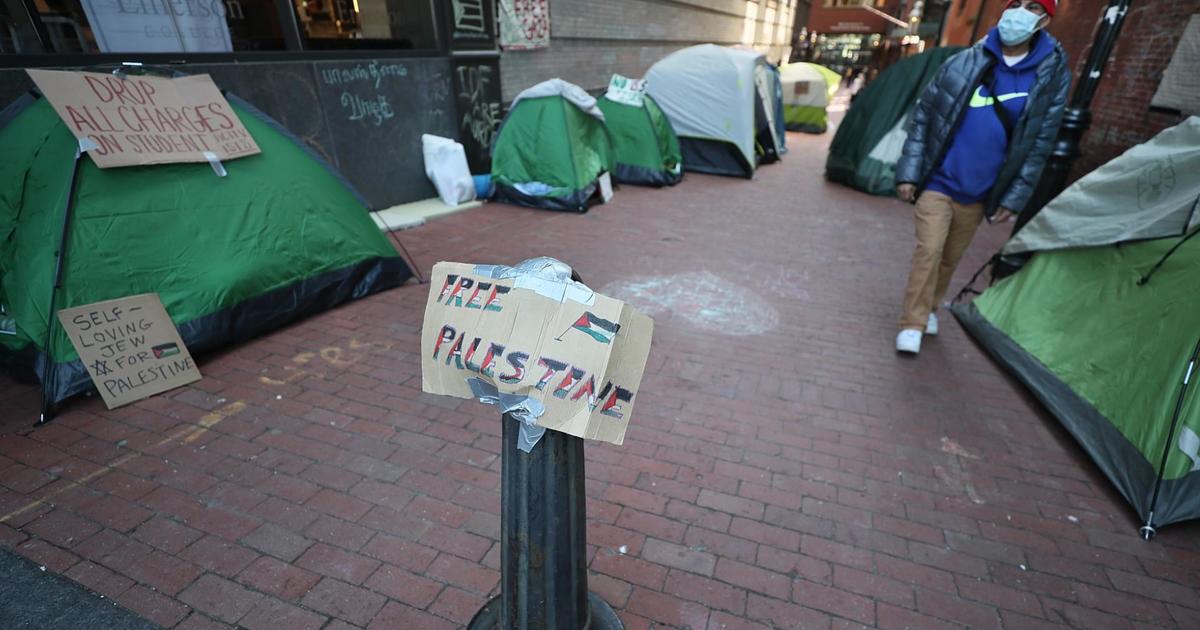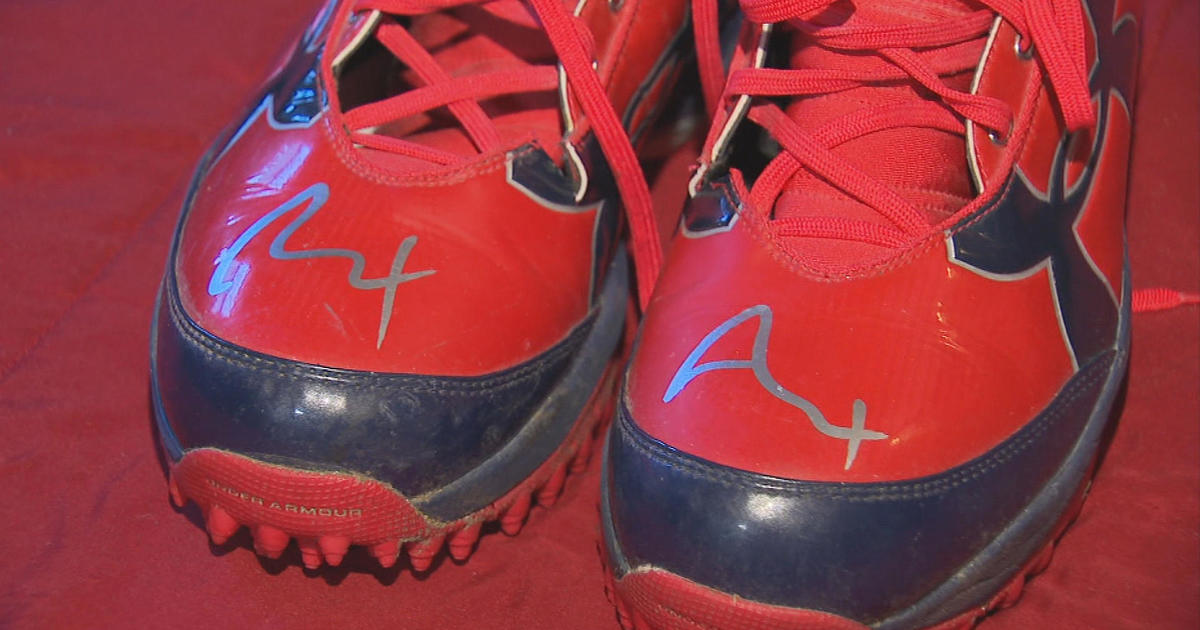A Guide To Preparing For Hurricane Irene
As Hurricane Irene takes aim at the East Coast, officials are urging Massachusetts residents to prepare for the worst.
What do you need to do to protect your home and your family when Irene hits? Here are some hurricane preparedness tips everyone should know.
WBZ NewsRadio 1030's Kim Tunnicliffe reports on residents in Swansea, Mass. preparing for Irene
Podcast
Stay Informed
The latest information can help you stay ahead of the storm.
- Listen or watch local news for the latest updates.
- Listen to NOAA Weather Radio for the latest emergency weather information.
- Track the storm to see where it's headed and what to expect.
- Check the Forecast and Alerts, Watch the Radar
Protect Your Family
Every family should have an emergency supply kit in case of a disaster. The Red Cross lists several essential items that should be included in any emergency supply kit.
- Water - At least a three-day supply of one gallon per person, per day.
- Food – At least a three-day supply of non-perishable, easy to make food.
- Battery-powered or hand-crank radio.
- Extra batteries.
- Flashlights.
- First aid kit.
- Medications – at least a seven-day supply. You should also include other medical items like hearing aids, glasses, contacts, syringes.
- Multi-purpose tool.
- Sanitation and personal hygiene items.
- Cell phone with chargers.
- Copies of personal documents: passports, birth certificates, etc.
- Family and emergency contact information.
- Extra cash.
- Baby supplies.
- Pet supplies.
- A whistle to signal for help.
- Local maps.
For more information about emergency supply kits, Visit the Massachusetts Red Cross online.
Protect Your Home
There are several things you can do to protect your home from damage during a hurricane, according to Ready.gov.
- Cover your windows with plywood or hurricane shutters to keep high winds from breaking windows.
- Bring all outdoor furniture or other loose items inside.
- Reinforce garage doors.
- Install a backup generator for emergencies.
- Make sure you have extra water on hand for cleaning, bathing and flushing toilets. Ready.gov recommends filling the bathtub and other large containers with water.
- Turn off propane tanks.
For more tips about protecting your home, click here.
In Case Evacuation is Necessary
Massachusetts Public Safety Officials may alert you by one or several methods. Learn what methods are utilized in your community. According to the state, they could include:
- Outdoor sirens or horns.
- The Emergency Alert System (EAS) - information provided on the radio and television.
- NOAA Weather Alert Radio.
- 'All Call' or 'Reverse 911' - an automated telephoning system for sending recorded messages.
- Mass.Gov Citizen Alert.
- Commercial News Media.
- Residential Route Alerting, which dispatches Public Safety vehicles through neighborhoods announcing messages with Public Address systems.
- U.S. Coast Guard Marine Broadcast.
- A message on Teletypewriters (TTY).
Planning an Evacuation
Ask your local Emergency Management Office about community evacuation plans.
- Learn proposed evacuation routes and locations of public shelters.
- If you do not have personal transportation, make arrangements with friends or your local government.
- Develop a Family Communications Plan.
- Make a plan with family members for a destination if you have to leave your community. In your planning, consider different scales of evacuation – neighborhood, town, county, etc.
- Assemble a Disaster Supply Kit.
- Keep your car fueled if evacuation seems likely. Gas stations may be closed during an emergency, or unable to pump gas during power outages.
- Know how to shut off your home's electricity, gas and water supplies at main switches and valves.
What To Do If You Are Told To Evacuate
- Gather all persons in the house together.
- Do not pick up children at their schools, unless instructed to do so. In many cases (particularly a Nuclear Emergency Plant event), they will be taken to designated host schools outside the area where you may pick them up later.
- Household members outside the area may be advised not to return during an evacuation. They may be directed to a reception center or mass care shelter where you can join them.
- Do not call your local fire or police departments for information. Emergency workers will need their lines for emergency use. If you need special help, call your local Emergency Management Office.
- Stay tuned to your Emergency Alert System radio station.
- Turn off lights and unnecessary appliances.
- If a hard freeze is likely during your absence, take actions needed to prevent damage to water pipes, such as turning off the water main, draining faucets, turning off inside valves for external faucets and opening outside faucets to drain.
- Close and lock windows and doors.
- Check with neighbors to see if they need assistance. Offer to share transportation.
- Let others know where you are going.
- If you need a ride, try to get one with neighbors or contact your local Emergency Management Office.
How To Travel
- Keep the car radio tuned to an Emergency Alert System station.
- Be aware of designated evacuation routes.
What To Take With You
Essential items only. You may be away from home for a few hours to a few days.
- Clothing for several days.
- Toilet articles (Soap, toothbrush, toothpaste, shampoo, etc.)
- Prescription medicines, medical equipment and important medical records.
- Special dietary foods.
- Baby supplies.
- Blankets, pillows, and towels (if you plan on staying at a Public Mass Care Shelter).
- Identification and important papers.
- Checkbook, credit card and cash.
If you have questions, contact your Emergency Management Director.
Your Pets
Only seeing-eye dogs and other service animals will be allowed inside reception centers and mass care shelters.
If you have pets, don't leave them out of your emergency plans. The National Hurricane Center and FEMA have some key tips for keeping your pets safe.
- Have extra pet food and water on hand plus any necessary medications.
- Make sure your pets are current on their vaccinations.
- Have a current photograph in case your pet gets lost.
- Make sure your pet is wearing a collar with identification and have a leash on hand.
- Have properly sized pet carriers for each animal.
- Have a place to take your pet – kennels, veterinary clinics and the homes of friends and relatives are all places you can take your pet in an emergency. Most emergency shelters will not take pets.
- Find a pet-friendly motel at www.petswelcome.com.
For more information about planning for your pet, click here.
After The Storm
After any severe storm, there could be damage, including flooding, downed trees, power outages, broken glass and more. The Red Cross says there are several things you should do after a hurricane hits.
- Stay informed – keep listening to NOAA Weather Radio broadcasts or your local news for the latest updates.
- Only return home when officials say it's safe.
- Drive only if necessary and avoid flooded roads.
- Stay away from loose or dangling power lines and report any you may see to local power companies.
- Inspect your home for damage.
- Take pictures of the damage for your insurance company.
- Avoid drinking or cooking food with tap water until you know it's safe.
- Wear protective clothing.
- Be careful walking around damaged areas in your home.
- Throw away any spoiled food.
Weather Links
Here are some additional weather links to help keep an eye on the storm.
Additional Links
Here are some additional hurricane links and resources.



